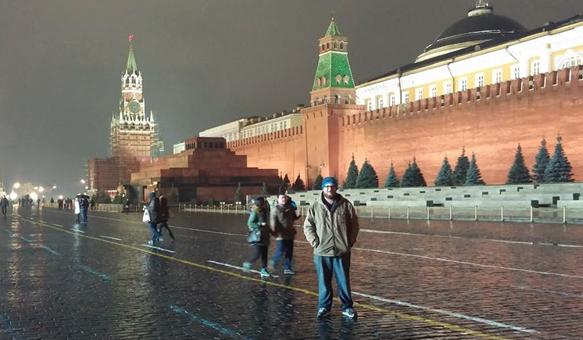Nate Proctor left the United States for Russia fluent in the language of the National Hockey League, but not fluent in Russian.
Proctor is spending his fall semester studying abroad in Russia, taking nine credit hours and working on his fluency in Russian, as well as in the play style of the Kontinental Hockey League, which is somewhat different from the NHL.
Proctor, a senior majoring in journalism and international studies, began writing for The St. Petersburg Times, a weekly-published English-language newspaper, in October. For his first article, Proctor wrote about a KHL game, providing game coverage and analysis of the play.
“It’s not just that [the KHL] is less physical, it’s that things that are a sign of things going well or going poorly for a team [in the NHL] are completely reversed here because the style of play is so different,” he said. “You need to change how you interpret the play here.”
In addition to a different style of play, KHL games are played on a large rink and spectators can expect a game atmosphere more comparable to a European soccer game than an NHL game, Proctor said. Each game also has one Russian-speaking announcer, who naturally incorporates idioms that aren’t always easily translated.
This is Proctor’s third year studying Russian, which is his minor. He said living with a homestay has helped improve his language skills. While St. Petersburg is tourist-friendly, it is not necessarily English-friendly, he said. Only a few citizens speak English.
Proctor’s sports-journalist position in Russia symbolizes a near-complete portrayal of his character, said Angela Ray, a close friend. Ray, a senior majoring in psychology, bonded with Proctor during their Bama Bound session before freshman year, she said.
“[Proctor] is just really knowledgeable about a lot of random things. I know a little bit about a lot more because of him,” Ray said. “He’s really into Russia, and he’s talked a lot about it.”
Proctor originally enrolled as a journalism major and later added his international studies major and Russian minor.
Proctor’s interest in Russia was also apparent to his professors. Barbara Chotiner, a retired professor of political science, had Proctor in a couple of her classes and recalled his interest in Russian, she said.
“[Proctor] was just a very able student with a strong interest in political developments in Russia, and he paid careful attention to them,” she said. “He has a sense of the way in which the past development of this country and part of the world affects the present.”
Proctor’s articles can be viewed online on The St. Petersburg Times’ website, sptimes.ru.









